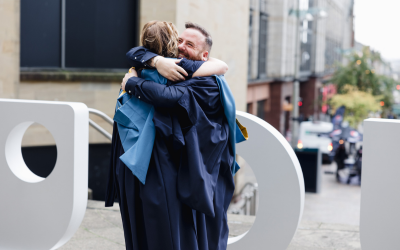You are here
- Home
- Need for better online resources for refugees and asylum seekers
Need for better online resources for refugees and asylum seekers

An Open University (OU) academic is calling for better curation of online learning for refugees and asylum seekers.
Professor Giles Mohan, Chair of International Development at the OU, is lead author on a report published today (Wednesday 28 November 2018) to mark World Access to Higher Education Day, which seeks to raise global awareness around inequalities in access and success in Higher Education.
The report, based on the Refugees’ Educational Resources (REfER) project, gathered data from 26 organisations that support refugees in Scotland and across the rest of the UK, which resulted in a list of over 500 relevant free online resources available to refugees and asylum seekers.
Vast online resources
Professor Mohan said:
“As a result of the Refugees’ Educational Resources Project, we have a clearer picture on the vast range of online resources available, a list we are making publicly available.
“We have identified many of the issues that are stopping refugees and asylum seekers learning, including language barriers, a fear of online monitoring and culturally biased materials. We now know that the issue is not about a shortage of materials, the question is how we provide refugees and asylum seekers with the tools and skills needed to utilise these online resources.”
The research also found that the main challenges for refugees and asylum seekers in accessing and using existing resources include the cost of getting online, lack of experience in learning online, lack of trust in the Internet, linguistic, cultural and technical barriers and scepticism about the value of online learning.
Need for themed content
Key recommendations of the report are:
• Involve refugees and asylum seekers in the decision-making and planning of their future.
• Develop the Resources Audit further in a format that is easily accessible by smartphone.
• Curate themed collections of relevance to these communities on the OU’s OpenLearn Create platform.
• Provide recognition of skills in the form of badges and certificates.
Professor Mohan concluded:
“Although we recognise the OU’s role in supporting education, there are so many issues that require policy adjustments to address and we hope this report will help stir that change.
"More resources need to go to frontline organisations that struggle to adequately support refugees, while the process of recognising overseas qualifications needs speeding up.
“The experience and skills that refugees and asylum seekers bring to the UK continue to be overlooked.
"We heard of a senior accountant from Syria, expected to wash dishes in the UK simply because they were trained in an Arabic software system, and of an experienced teacher denied teaching work in the UK as her English proficiency level was deemed too low.
“The project highlighted how much work is needed to fully understand and value the contribution refugees and asylum seekers can and are making to the UK.”
News
Media contacts
Media enquiries
OU in Scotland Media Relations:
Call 0131 549 7932
OU UK Press Office:
Call 01908 654316
Out-of-hours:
07901 515 891
Visit our OU UK news site

